John Driscoll
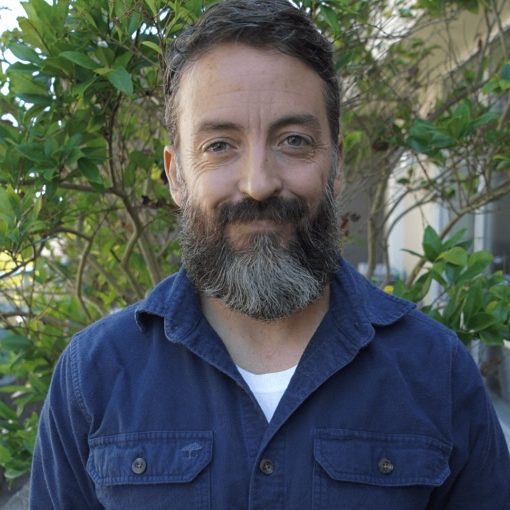
Bio
Food production is the single greatest driver of direct anthropogenic impacts on both terrestrial and marine ecosystems. Improving the sustainability of our food systems is thus one of humanity’s great challenges. Through his research, John seeks to bring a food system perspective to fisheries, in order to understand how fisheries produce food for people, identify options for improved performance, develop approaches by which fisheries science and management can be informed with food-related considerations, and integrate fisheries into broader food-related dialogues. Ultimately, John hopes to engage in work that would result in the integration of a food system perspective with ecosystem-based approaches for fisheries.
Currently, John’s specific areas of interest include the development of approaches for analyzing and evaluating fisheries’ nutrient yields, the implications of bait use for fisheries’ nutrient yields, the potential implications of a Canadian seaweed aquaculture industry for both climate change and food production, and the transfer of nutrients from marine to terrestrial ecosystems via fisheries. More broadly, John is interested in food system sustainability, the role of wild animals in food systems, marine habitat conservation, ecosystem-based fisheries management, and developing principles for long-term resilience in fisheries. John has a PhD from UBC’s Institute for Resources, Environment and Sustainability, where he was in Kai Chan’s lab, and is the fisheries science and policy analyst for David Suzuki Foundation.
Please do not hesitate to get in touch!
LinkedIn: www.linkedin.com/in/john-david-driscoll
December 7, 2023: IRES Student Seminar with Evelyn Arriagada Oyarzún and Jumi Gogoi (Last seminar in Term 1)
1. Women+ counter-mapping hydrosocial territories: activists’ practices of knowledge co-production in the Chiloé archipelago (southern Chile)
2. Developing a field-scale crop yield prediction model using satellite and environmental data – Jumi cancelled. She is sick.
Time: 12:30pm to 1:20pm
Location: Changed to AERL Building Room 107 (2202 Main Mall)
View Video Here
Talk summary:
The Chiloé archipelago (in southern Chile) is considered one of the world’s priority areas for ecosystem conservation. Although this zone has high rainfall throughout the year, several localities face seasonal water scarcity driven by climate change, over-exploitation of peatlands and native forests, and other environmental interventions. Peasant and Indigenous women have been the primary knowledge keepers of Chiloé’s ecological and cultural heritage, although they have been excluded from natural resource-related decision-making processes. In 2021, an organization of islander women+’s water defenders – the Asamblea de Mujeres por las Aguas (AMIPA) – started identifying and geo-locating water-related problems and conflicts in the archipelago. As an experience driven by activists/researchers, this counter-mapping process is challenging dominant narratives about water and territories while enhancing anti-patriarchal and anti-colonial ways of organizing and building collaborative knowledge.
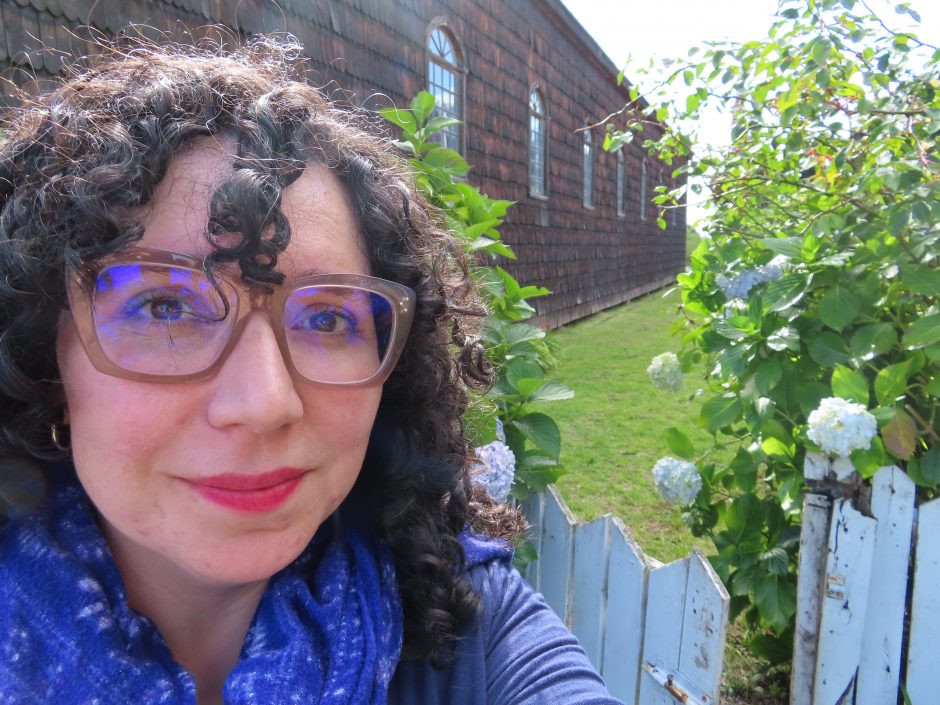
Bio:
Evelyn Arriagada is an anthropologist and holds an MA in social sciences (Universidad de Chile), an MA in Political and Social Sciences (Universitat Pompeu Fabra), and is a Ph.D. candidate at the Institute for Resources, Environment and Sustainability (UBC). Her dissertation focuses on shifting subjectivities and hydrosocial relationships in contemporary water justice movements in Chile. Her Ph.D. is supported by a Vanier CGS Award, Killam Doctoral Scholarship, Public Scholar Initiative, and the National Agency for Research and Development (ANID – Chile) – among other funding. Her most recent co-authored publication explores the experiences of ‘lived environmental citizenship’ in female rural leaders in central Chile.
Talk summary:
This talk is cancelled. Jumi is sick.
Timely and reliable estimation of crop production is essential for strategic decision making in the agricultural system. Recently, detailed ground-based field-scale yield datasets have become available providing a timely opportunity for using high spatial resolution observational data for model training. The key research objective was to develop a crop-yield prediction model using satellite and biophysical data and calibrated using field-scale yield monitor data. We conducted a thorough assessment using machine and deep learning methods and different combinations of features. Results showed that an integrated dataset combining different types of inputs improved yield estimation over using only satellite-based inputs. Random Forests recorded the highest prediction accuracy in comparison to all other modeling algorithms for every crop. Using the optimized model for within-season yield forecasting, we found that reasonable field level forecasts can be achieved within three months of lead time before harvesting for canola and wheat.

Bio:
Jumi is a PhD candidate working under the supervision of Dr. Navin Ramankutty. She is pursuing her research interests in mobilizing methods from data science to answer questions about food security. Her PhD work specifically focuses on developing modeling methods using different datasets for improving prediction of crop production. Jumi has an interdisciplinary academic background and has completed studies in analytics, economics, and business.
Kai Chan
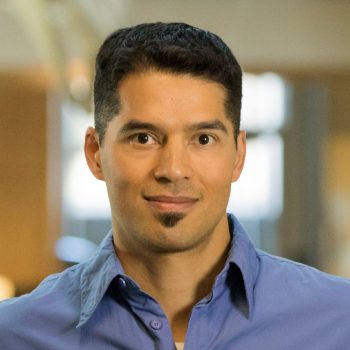
Kai Chan
Professor, IRES
Professor, Institute for Oceans and Fisheries
Canada Research Chair (T1, Re-Wilding and Social-Ecological Transformation)
Contact Details
AERL Room 438
2202 Main Mall
The University of British Columbia
Vancouver, BC V6T 1Z4
Canada
http://chanslab.ires.ubc.ca/people/chan/
https://www.cosphere.net/
Google Scholar: https://scholar.google.ca/citations?user=OByl3J0AAAAJ
ResearchGate: https://www.researchgate.net/profile/Kai_Chan3
Research Interests
Bio
Kai Chan is a professor at the Institute for Resources, Environment and Sustainability at the University of British Columbia, and Canada Research Chair Tier 1 in Re-Wilding and Social-Ecological Transformation. Kai is an interdisciplinary, problem-oriented sustainability scientist, trained in ecology, policy, and ethics from Princeton and Stanford Universities. He strives to understand how social-ecological systems can be transformed to be both better and wilder. Kai leads CHANS lab (Connected Human-and-Natural Systems), and is co-founder of CoSphere (a Community of Small-Planet Heroes). He is a UBC Killam Research Fellow; a member of Canada’s Clean16 and Clean50 for 2020; a Leopold Leadership Program fellow; senior fellow of the Global Young Academy and of the Environmental Leadership Program; a member of the Royal Society of Canada’s College of New Scholars, Artists and Scientists; Lead Editor of the new British Ecological Society journal People and Nature; a coordinating lead author for the IPBES Global Assessment; and (in 2012) the Fulbright Canada Visiting Research Chair at the University of California, Santa Barbara.
Courses
RES 508 Ecosystem Services
RES 602 Interdisciplinary Research Design for Sustainability
ENVR 430 The Ecological Dimensions of Sustainability
Featured Publications
A recent selection (see also my profiles on Google citations and ResearchGate, and my CV)
Eyster, H.N., R.K. Gould, K.M.A. Chan and T. Satterfield (2025). “Use of theories of human action in recent conservation research.” Conservation Biology 39(2): e14461. Doi: 10.1111/cobi.14461
Woodburn, E., C.C. Murray, E.J. Gregr, K.M.A. Chan and A. Stock (2025). “The many pathways of climate change affecting coastal ecosystems: a case study of western Vancouver Island, Canada.” FACETS 10: 1-18. Doi: 10.1139/facets-2024-0043
Jung, N.J., H.N. Eyster and K.M.A. Chan “Re-envisioning urban landscapes: lichens, liverworts, and mosses coexist spontaneously with us.” Frontiers in Ecology and the Environment n/a(n/a): e2836. Doi: 10.1002/fee.2836
Anderson, L.M., M. Chapman, B. Muraca and K.M.A. Chan “Transformative influence? The hedonic and eudaimonic sustainabilities of social media influencers.” Environmental Communication: 1-19. Doi: 10.1080/17524032.2025.2458227
Easter, T.S., A.R. Santo, A.H. Sage, N.H. Carter, K.M.A. Chan and J.I. Ransom “Divergent values and perspectives drive three distinct viewpoints on grizzly bear reintroduction in Washington, the United States.” People and Nature n/a(n/a). Doi: 10.1002/pan3.10748
Eyster, H.N., K.M.A. Chan, M.E. Fletcher and B. Beckage (2024). “Space-for-time substitutions exaggerate urban bird–habitat ecological relationships.” Journal of Animal Ecology 93(12): 1854–1867. Doi: 10.1111/1365-2656.14194
Naito, R., K.M.A. Chan, R. López de la Lama and J. Zhao (2024). “Audience segmentation approach to conservation messaging for transforming the exotic pet trade.” Conservation Biology 38(4): e14267. Doi: 10.1111/cobi.14267
Mitchell, M.G.E., J. Qiu, B.J. Cardinale, K.M.A. Chan, F. Eigenbrod, M.R. Felipe-Lucia, A.L. Jacob, M.S. Jones and L.J. Sonter (2024). “Key questions for understanding drivers of biodiversity-ecosystem service relationships across spatial scales.” Landscape Ecology 39(2): 36. Doi: 10.1007/s10980-024-01842-y
López de la Lama, R., N. Bennett, J. Bulkan, S. de la Puente and K.M.A. Chan (2024). “Not in it for the money: Meaningful relationships sustain voluntary land conservation initiatives in Peru.” People and Nature 6(2): 818-832. Doi: 10.1002/pan3.10600
Naito, R., K.M.A. Chan and J. Zhao (2024). “Combating the exotic pet trade: Effects of conservation messaging on attitudes, demands, and civic intentions.” Conservation Science and Practice 6(2): e13078. Doi: 10.1111/csp2.13078
Benessaiah, K. and K.M. Chan (2023). “Why reconnect to nature in times of crisis? Ecosystem contributions to the resilience and well-being of people going back to the land in Greece.” People and Nature 5(6): 2026-2047. Doi: 10.1002/pan3.10546
Sánchez, C., E.J. Gregr, E.A. Parkinson and K.M.A. Chan (2023). “The benefits of climate change mitigation to retaining rainbow trout habitat in British Columbia, Canada.” Regional Environmental Change 23(3): 108. 10.1007/s10113-023-02097-0
Stock, A., E.J. Gregr and K.M.A. Chan (2023). “Data leakage jeopardizes ecological applications of machine learning.” Nature Ecology & Evolution. Doi: 10.1038/s41559-023-02162-1
Naito, R., J. Zhao, R. Naidoo and K.M.A. Chan “Private and civic actions as distinct types of individual engagement for transforming the exotic pet trade.” People and Nature n/a(n/a). Doi: 10.1002/pan3.10517
López de la Lama, R., N. Bennett, J. Bulkan, D. Boyd and K.M.A. Chan (2023). “A legal assessment of private land conservation in South America.” Conservation Biology 37(4): e14068. Doi: 10.1111/cobi.14068
Eyster, H.N., T. Satterfield and K.M.A. Chan (2023). “Empirical examples demonstrate how relational thinking might enrich science and practice.” People and Nature 5(2): 455–469. Doi: 10.1002/pan3.10453
Loos, J., F. Benra, M. Berbés-Blázquez, L.L. Bremer, K.M.A. Chan et al. (14 authors total) (2023). “An environmental justice perspective on ecosystem services.” Ambio 52(3): 477-488. Doi: 10.1007/s13280-022-01812-1
Stock, A., C.C. Murray, E.J. Gregr, J. Steenbeek, E. Woodburn, F. Micheli, V. Christensen and K.M.A. Chan (2023). “Exploring multiple stressor effects with Ecopath, Ecosim, and Ecospace: Research designs, modeling techniques, and future directions.” Science of The Total Environment 869: 161719. Doi: 10.1016/j.scitotenv.2023.161719
Driscoll, J. and K.M.A. Chan (2023). “Assessing fisheries nutrient yields: The Northwest Atlantic, 1950–2014.” Ambio 52: 271–284. Doi: 10.1007/s13280-022-01795-z
Eyster, H.N., D.S. Srivastava, M. Kreitzman and K.M.A. Chan (2022). “Functional traits and metacommunity theory reveal that habitat filtering and competition maintain bird diversity in a human shared landscape.” Ecography 2022(11): e06240. Doi: 10.1111/ecog.06240
Eyster, H.N., R. Naidoo and K.M.A. Chan “Not just the Big Five: African ecotourists prefer parks brimming with bird diversity.” Animal Conservation 26(4): 428–442. Doi: 10.1111/acv.12816
Driscoll, J. and K.M.A. Chan (2022). “Net negative nutrient yields in a bait-consuming fishery.” Environmental Research Letters 17(8): 084024. Doi: 10.1088/1748-9326/ac82c0
Eyster, H.N., T. Satterfield and K.M.A. Chan (2022). “Why people do what they do: An interdisciplinary synthesis of human action theories.” Annual Review of Environment and Resources 47(1): 725–751. Doi: 10.1146/annurev-environ-020422-125351
Campos, A.A., C.D. Bullen, E.J. Gregr, I. McKechnie and K.M.A. Chan (2022). “Steller’s sea cow uncertain history illustrates importance of ecological context when interpreting demographic histories from genomes.” Nature Communications 13(1): 3674. Doi: 10.1038/s41467-022-31381-6
Fish, R., K.M.A. Chan, C. Maller, R.S. Hails, E. Aimé and K.J. Gaston (2022). “People and nature: The emerging signature of a relational journal.” People and Nature 4(3): 592-595. Doi: 10.1002/pan3.10339
Lliso, B., D. Lenzi, B. Muraca, K.M.A. Chan and U. Pascual (2022). “Nature’s disvalues: what are they and why do they matter?” Current Opinion in Environmental Sustainability 56: 101173. Doi: 10.1016/j.cosust.2022.101173
Naito, R., J. Zhao and K.M.A. Chan (2022). “An integrative framework for transformative social change: a case in global wildlife trade.” Sustainability Science 17: 171–189 Doi: 10.1007/s11625-021-01081-z
Eyster, H.N., P. Olmsted, R. Naidoo and K.M.A. Chan (2022). “Motivating conservation even for widespread species using genetic uniqueness and relational values.” Biological Conservation 266: 109438. Doi: 10.1016/j.biocon.2021.109438
Kreitzman, M., H. Eyster, M. Mitchell, A. Czajewska, K. Keeley, S. Smukler, N. Sullivan, A. Verster and K.M.A. Chan (2022). “Woody perennial polycultures in the U.S. Midwest enhance biodiversity and ecosystem functions.” Ecosphere 13(1): e03890. Doi: 10.1002/ecs2.3890
Kreitzman, M., M. Chapman, K.O. Keeley and K.M.A. Chan (2022). “Local knowledge and relational values of Midwestern woody perennial polyculture farmers can inform tree-crop policies.” People and Nature 4(1): 180–200. Doi: 10.1002/pan3.10275
Bullen, C.D., A.A. Campos, E.J. Gregr, I. McKechnie and K.M.A. Chan “The ghost of a giant – Six hypotheses for how an extinct megaherbivore structured kelp forests across the North Pacific Rim.” Global Ecology and Biogeography n/a(n/a). Doi: 10.1111/geb.13370
Ono, A.J., D.R. Boyd and K.M.A. Chan “Acculturation as an ecosystem service? Urban natural space supports evolving relational values and identity in new female migrants.” People and Nature n/a(n/a). Doi: 10.1002/pan3.10188
Mitchell, M.G.E., R. Schuster, A.L. Jacob, D.E.L. Hanna, C.O. Dallaire, C. Raudsepp-Hearne, E.M. Bennett, B. Lehner and K.M.A. Chan (2021). “Identifying key ecosystem service providing areas to inform national-scale conservation planning.” Environmental Research Letters 16(1): 014038. Doi: 10.1088/1748-9326/abc121 [Altimetric score 404]
Mitchell, M.G.E., K.M.A. Chan, N.K. Newlands and N. Ramankutty (2020). “Spatial correlations don’t predict changes in agricultural ecosystem services: A Canada-wide case study.”Frontiers in Sustainable Food Systems 4(235). Doi: 10.3389/fsufs.2020.539892
Kreitzman, M., E. Toensmeier, K.M.A. Chan, S. Smukler and N. Ramankutty (2020). “Perennial staple crops: Yields, distribution, and nutrition in the global food system.” Frontiers in Sustainable Food Systems 4(216). Doi: 10.3389/fsufs.2020.588988
López de la Lama, R., S. de la Puente, J.C. Sueiro and K.M.A. Chan “Reconnecting with the past and anticipating the future: A review of fisheries-derived cultural ecosystem services in pre-Hispanic Peru.” People and Nature 3(1): 129-147. Doi: 10.1002/pan3.10153
Echeverri, A., D.S. Karp, L.O. Frishkoff, J. Krishnan, R. Naidoo, J. Zhao, J. Zook and K.M.A. Chan“Avian cultural services peak in tropical wet forests.” Conservation Letters n/a(n/a): e12763. Doi 10.1111/conl.12763
Chan, K.M.A. and T. Satterfield (2020). “The maturation of ecosystem services: Social and policy research expands, but whither biophysically-informed valuation?” People and Nature 2(4): 1021-1060. Doi: 10.1002/pan3.10137
Klain, S., T. Satterfield, K.M.A. Chan and K. Lindberg (2020). “Octopus’s garden under the blade: Boosting biodiversity increases willingness to pay for offshore wind in the United States.”Energy Research & Social Science 69: 101744. Doi: 10.1016/j.erss.2020.101744
Chan, K.M.A., D.R. Boyd, R.K. Gould, J. Jetzkowitz, J. Liu, B. Muraca, R. Naidoo, P. Olmsted, T. Satterfield, O. Selomane, G.G. Singh, R. Sumaila, H.T. Ngo, A.K. Boedhihartono, J. Agard, A. P. D. d. Aguiar, D. Armenteras, L. Balint, C. Barrington-Leigh, W.W.L. Cheung, S. Díaz, J. Driscoll, K. Esler, H. Eyster, E.J. Gregr, S. Hashimoto, G.C.H. Pedraza, T. Hickler, M. Kok, T. Lazarova, A.A.A. Mohamed, M. Murray-Hudson, P. O’Farrell, I. Palomo, A.K. Saysel, R. Seppelt, J. Settele, B. Strassburg, D. Xue and E.S. Brondízio (2020). “Levers and Leverage Points for Pathways to Sustainability.” People and Nature. Doi: 10.1002/pan3.10124
Gregr, E.J., V. Christensen, L. Nichol, R.G. Martone, R.W. Markel, J. C. Watson, C. D. G. Harley, E. A. Pakhomov, J. B. Shurin and K.M.A. Chan (2020). “Cascading social-ecological costs and benefits triggered by a recovering keystone predator.” Science 368(6496): 1243-1247. Doi: 10.1126/science.aay5342 [51 news outlets, Altimetric score=500]
Singh, G.G., I.M.S. Eddy, B.S. Halpern, R. Neslo, T. Satterfield and K.M.A. Chan (2020). “Mapping cumulative impacts to coastal ecosystem services in British Columbia.” PLOS ONE 15(5): e0220092. Doi: 10.1371/journal.pone.0220092
Díaz, S., J. Settele, E.S. Brondízio, H.T. Ngo, J. Agard, A. Arneth, P. Balvanera, K.A. Brauman, S.H.M. Butchart, K.M.A. Chan, L.A. Garibaldi, K. Ichii, J. Liu, S.M. Subramanian, G.F. Midgley, P. Miloslavich, Z. Molnár, D. Obura, A. Pfaff, S. Polasky, A. Purvis, J. Razzaque, B. Reyers, R.R. Chowdhury, Y.-J. Shin, I. Visseren-Hamakers, K.J. Willis and C.N. Zayas (2019). “Pervasive human-driven decline of life on Earth points to the need for transformative change.” Science 366(6471): Doi: 10.1126/science.aax3100
Rodina, L. and K.M.A. Chan (2019). “Expert views on strategies to increase water resilience: evidence from a global survey.” Ecology and Society 24(4). https://www.ecologyandsociety.org/vol24/iss4/art28/
Olmsted, P., J. Honey-Rosés, T. Satterfield and K.M.A. Chan (2019). “Leveraging support for conservation from ecotourists: can relational values play a role?” Journal of Sustainable Tourism: 1-18. Doi: 10.1080/09669582.2019.1683184
Echeverri, A., D.S. Karp, R. Naidoo, J.A. Tobias, J. Zhao and K.M.A. Chan “Can avian functional traits predict cultural ecosystem services?” People and Nature 0(0). Doi: 10.1002/pan3.10058
(2019). “Connecting with Nature.” One Earth. Doi: 10.1016/j.oneear.2019.08.001
Gould, R.K., M. Pai, B. Muraca and K.M.A. Chan (2019). “He ʻike ʻana ia i ka pono (it is a recognizing of the right thing): how one indigenous worldview informs relational values and social values.” Sustainability Science. Doi: 10.1007/s11625-019-00721-9
Singh, G.G., V.F. Farjalla, B. Chen, … K.M.A. Chan (2019). “Researcher engagement in policy deemed societally beneficial yet unrewarded.” Frontiers in Ecology and the Environment 0(0). Doi: 10.1002/fee.2084
Singh, G.G., J. Lerner, C. Clarke Murray, J. Wong, M. Mach, B. Ranieri, G. Peterson St-Laurent, A. Guimaraes and K.M.A. Chan (2019). “Response to critique of “The Insignificance of Thresholds in Environmental Impact Assessment: An Illustrative Case Study in Canada”.” Environmental Management. Doi: 10.1007/s00267-019-01182-7
Echeverri, A., R. Naidoo, D.S. Karp, K.M.A. Chan and J. Zhao (2019). “Iconic manakins and despicable grackles: Comparing cultural ecosystem services and disservices across stakeholders in Costa Rica.” Ecological Indicators 106: 105454. Doi: 10.1016/j.ecolind.2019.105454
Karp, D.S., A. Echeverri, J. Zook, P. Juárez, A. Ke, J. Krishnan, K.M.A. Chan, L.O. Frishkoff (2019). “Remnant forest in Costa Rican working landscapes fosters bird communities that are indistinguishable from protected areas.” Journal of Applied Ecology 56(7): 1839-1849. Doi: 10.1111/1365-2664.13419
Echeverri, A., L.O. Frishkoff, J.P. Gomez, J.R. Zook, P. Juárez, R. Naidoo, K.M.A. Chan, D.S. Karp (2019) “Precipitation and tree cover gradients structure avian alpha diversity in North-western Costa Rica.” Diversity and Distributions 25(8): 1222-1233. Doi: 10.1111/ddi.12932
Westwood, A.R., S.P. Otto, A. Mooers, C. Darimont, K.E. Hodges, C. Johnson, … K.M.A. Chan, … J. Whitton (2019). “Protecting biodiversity in British Columbia: Recommendations for developing species at risk legislation.” FACETS 4(1): 136-160. Doi: 10.1139/facets-2018-0042
Chan, K.M.A., R.K. Gould and U. Pascual (2018). “Editorial overview: Relational values: what are they, and what’s the fuss about?” Current Opinion in Environmental Sustainability 35: A1-A7. Doi: 10.1016/j.cosust.2018.11.003 (ER)
Gaston, K.J., E. Aimé, K.M.A. Chan, R. Fish, R.S. Hails and C. Maller. (in press). “People and nature—A journal of relational thinking.” People and Nature 0(0). Doi: 10.1002/pan3.7 (ER)
Jax, K., M. Calestani, K.M.A. Chan, et al. (2018). “Caring for nature matters: a relational approach for understanding nature’s contributions to human well-being.” Current Opinion in Environmental Sustainability. Doi: 10.1016/j.cosust.2018.10.009
Gregr, E.J., D.M. Palacios, A. Thompson and K.M.A. Chan (2018). “Why less complexity produces better forecasts: An independent data evaluation of kelp habitat models.” Ecography 0(ja). Doi: 10.1111/ecog.03470
Šunde, C., J. Sinner, M. Tadaki, J. Stephenson, B. Glavovic, S. Awatere, A. Giorgetti, N. Lewis, A. Young, K. Chan. (2018). “Valuation as destruction? The social effects of valuation processes in contested marine spaces.” Marine Policy 97(Nov): 170-178. Doi: 10.1016/j.marpol.2018.05.024
Frishkoff, L.O., A. Echeverri, K.M.A. Chan and D.S. Karp “Do correlated responses to multiple environmental changes exacerbate or mitigate species loss?” Oikos 127(12): 1724-1734. Doi: 10.1111/oik.05288
Echeverri, A., D.S. Karp, R. Naidoo, J. Zhao and K.M.A. Chan (2018). “Approaching human-animal relationships from multiple angles: A synthetic perspective.” Biological Conservation 224: 50-62. Doi: 10.1016/j.biocon.2018.05.015
Clarke Murray, C., J. Wong, G.G. Singh, M. Mach, J. Lerner, B. Ranieri, G. Peterson St-Laurent, A. Guimaraes and K.M.A. Chan (2018). “The insignificance of thresholds in Environmental Impact Assessment: An Illustrative Case Study in Canada.” Environmental Management 61(6): 1062-1071. Doi: 10.1007/s00267-018-1025-6
Díaz, S., U. Pascual, M. Stenseke, B. Martín-López, R.T. Watson, Z. Molnár, R. Hill, K.M.A. Chan, I. Baste, et al. (2018). “There is more to nature’s contributions to people than ecosystem services—A response to de Groot et al.” and “Shifts, drifts and options—A response to Faith”. Science 359(6373): e-letter. (ER)
Tam, J., K.M.A. Chan, T. Satterfield, G.G. Singh and S. Gelcich (2018). “Gone fishing? Intergenerational cultural shifts can undermine common property co-managed fisheries.” Marine Policy 90: 1-5. Doi: 10.1016/j.marpol.2018.01.025
Díaz, S., U. Pascual, M. Stenseke, B. Martín-López, R.T. Watson, Z. Molnár, R. Hill, K.M.A. Chan, I. Baste, et al. (2018). “Assessing nature’s contributions to people.” Science 359(6373): 270-272. Doi: 10.1126/science.aap8826
Kreitzman, M., J. Ashander, J. Driscoll, A.W. Bateman, K.M.A. Chan, M.A. Lewis and M. Krkosek (2018). “Wild salmon sustain the effectiveness of parasite control on salmon farms: Conservation implications from an evolutionary ecosystem service.” Conservation Letters 11(2): e12395. Doi: 10.1111/conl.12395
Karp, D.S., L.O. Frishkoff, A. Echeverri, J. Zook, P. Juárez and K.M.A. Chan (2018). “Agriculture erases climate-driven β-diversity in Neotropical bird communities.” Global Change Biology 24(1): 338-349. Doi: 10.1111/gcb.13821
Chapman, M., S. Klassen, M. Kreitzman, A. Semmelink, K. Sharp, G. Singh and K.M.A. Chan (2017). “5 Key challenges and solutions for governing complex adaptive (food) systems.” Sustainability 9(9): 1594. Doi: 10.3390/su9091594
Klain, S.C., P. Olmsted, K.M.A. Chan and T. Satterfield (2017). “Relational values resonate broadly and differently than intrinsic or instrumental values, or the New Ecological Paradigm.” PLOS ONE 12(8): e0183962. Doi: 10.1371/journal.pone.0183962
Rudman, S.M., M. Kreitzman, K.M.A. Chan and D. Schluter (2017). “Contemporary evosystem services: A reply to Faith et al.” Trends in Ecology & Evolution 32(10): 719-720. Doi: 10.1016/j.tree.2017.07.006 (ER)
Singh, G.G., J. Sinner, J. Ellis, M. Kandlikar, B.S. Halpern, T. Satterfield and K. Chan (2017). “Group elicitations yield more consistent, yet more uncertain experts in understanding risks to ecosystem services in New Zealand bays.” PLOS ONE 12(8): e0182233. Doi: 10.1371/journal.pone.0182233
Kearney, S.P., N.C. Coops, K.M.A. Chan, S.J. Fonte, P. Siles and S.M. Smukler (2017). “Predicting carbon benefits from climate-smart agriculture: High-resolution carbon mapping and uncertainty assessment in El Salvador.” Journal of Environmental Management 202, Part 1: 287-298. Doi: 10.1016/j.jenvman.2017.07.039
Klain, S.C., T. Satterfield, J. Sinner, J.I. Ellis and K.M.A. Chan (2018). “Bird killer, industrial intruder or clean energy? Perceiving risks to ecosystem services due to an offshore wind farm.” Ecological Economics 143: 111-129. Doi: 10.1016/j.ecolecon.2017.06.030
Pascual, U., I. Palomo, W.M. Adams, K.M.A. Chan, et al. (2017). “Off-stage ecosystem service burdens: A blind spot for global sustainability.” Environmental Research Letters 12(7): 075001. Doi: 10.1088/1748-9326/aa7392
Klain, S.C., T. Satterfield, S. MacDonald, N. Battista and K.M. A. Chan (2017). “Will communities “open-up” to offshore wind? Lessons learned from New England islands in the United States.” Energy Research & Social Science 34: 13-26. Doi: 10.1016/j.erss.2017.05.009
Singh, G.G., J. Sinner, J. Ellis, M. Kandlikar, B.S. Halpern, T. Satterfield and K.M.A. Chan (2017). “Mechanisms and risk of cumulative impacts to coastal ecosystem services: An expert elicitation approach.” Journal of Environmental Management 199: 229-241. Doi: 10.1016/j.jenvman.2017.05.032
Kaltenborn, B.P., J.D.C. Linnell, E. Gómez-Baggethun, H. Lindhjem, J. Thomassen and K.M. Chan (2017). “Ecosystem services and cultural values as building blocks for ‘the good life’. A case study in the community of Røst, Lofoten Islands, Norway.” Ecological Economics 140: 166-176. Doi: 10.1016/j.ecolecon.2017.05.003
Chan, K.M.A., E. Anderson, M. Chapman, K. Jespersen and P. Olmsted (2017). “Payments for ecosystem services: Rife with problems and potential—for transformation towards sustainability.” Ecological Economics: 140(Oct): 10-11. Doi: 10.1016/j.ecolecon.2017.04.029
Rudman, S.M., M. Kreitzman, K.M.A. Chan and D. Schluter (2017). “Evosystem services: Rapid evolution and the provision of ecosystem services.” Trends in Ecology & Evolution. Doi: 10.1016/j.tree.2017.02.019
Chan, K.M.A., P. Olmsted, N.J. Bennett, S.C. Klain and E. Williams. Can ecosystem services make conservation normal and commonplace? Conservation for the Anthropocene Ocean: Interdisciplinary science in support of nature and people. P.S. Levin and M.R. Poe. Elsevier, 2017 in press.
Balvanera, P., S. Quijas, D. S. Karp, N. Ash, E. M. Bennett, R. Boumans, C. Brown, K.M.A. Chan, et al. Ecosystem services. The GEO Handbook on Biodiversity Observation Networks. M. Walters and R. J. Scholes. Cham, Switzerland, Springer Open, 2016. 39-78. url
Chan, K.M.A. and T. Satterfield. Managing cultural ecosystem services for sustainability. Routledge Handbook of Ecosystem Services. Eds. M. Potschin, R. Haines-Young, R. Fish and R.K. Turner. Abingdon, Oxon, Routledge, 2016. 343-358.
Chapman, M., A. LaValle, G. Furey and K.M.A. Chan (2017). “Sustainability beyond city limits: can “greener” beef lighten a city’s Ecological Footprint?” Sustainability Science: 1-14. Doi: 10.1007/s11625-017-0423-7
Levine, J., M. Muthukrishna, K.M.A. Chan and T. Satterfield (2017). “Sea otters, social justice, and ecosystem-service perceptions in Clayoquot Sound, Canada.” Conservation Biology: n/a-n/a. Doi: 10.1111/cobi.12795
Echeverri, A., M.M. Callahan, K.M.A. Chan, T. Satterfield and J. Zhao (2017). “Explicit not implicit preferences predict conservation intentions for endangered species and biomes.” PLOS ONE 12(1): e0170973. Doi: 10.1371%2Fjournal.pone.0170973
Tadaki, M., J. Sinner and K.M.A. Chan (2017). “Making sense of environmental values: a typology of concepts.” Ecology and Society 22(1). Doi: 10.5751/ES-08999-220107
Echeverri, A., K.M.A. Chan and J. Zhao (2017). “How messaging shapes attitudes toward sea otters as a species at risk.” Human Dimensions of Wildlife: 1-15. Doi: 10.1080/10871209.2016.1272146
Bennett, N.J., R. Roth, S.C. Klain, K.M.A. Chan, D.A. Clark, G. Cullman, G. Epstein, M.P. Nelson, R. Stedman, T.L. Teel, R.E.W. Thomas, C. Wyborn, D. Curran, A. Greenberg, J. Sandlos and D. Veríssimo. (2016). “Mainstreaming the social sciences in conservation.” Conservation Biology: n/a-n/a. Doi: 10.1111/cobi.12788
Bennett, N.J., R. Roth, S.C. Klain, K.M.A. Chan, P. Christie, D.A. Clark, G. Cullman, D. Curran, G. Epstein, A. Greenberg, M.P. Nelson, J. Sandlos, R. Stedman, T.L. Teel, R.E.W. Thomas, D. Veríssimo, C. Wyborn. (2017). Conservation social science: Understanding and integrating human dimensions to improve conservation.” Biological Conservation 205(Jan): 93-108. Doi: 10.1016/j.biocon.2016.10.006
Clarke Murray, C., M.E. Mach, R.G. Martone, G.G. Singh, M. O and K.M.A. Chan (2016). “Supporting risk assessment: Accounting for indirect risk to ecosystem components.” PLOS ONE 11(9): e0162932. Doi: 10.1371/journal.pone.0162932
Mach, M.E., C.D. Levings and K.M.A. Chan (2016). “Nonnative species in British Columbia eelgrass beds spread via shellfish aquaculture and stay for the mild climate.” Estuaries and Coasts: 1-13. Doi: 10.1007/s12237-016-0124-y
Chan, K.M.A., P. Balvanera, K. Benessaiah, et al. (2016). “Why protect nature? Rethinking values and the environment.” PNAS 113(6): 1462–1465. Doi: 10.1073/pnas.1525002113 (ER)
Wieland, R., S. Ravensbergen, E.J. Gregr, T. Satterfield and K.M.A. Chan (2016). “Debunking trickle-down ecosystem services: The fallacy of omnipotent, homogeneous beneficiaries.” Ecological Economics 121: 175-180. Doi: 10.1016/j.ecolecon.2015.11.007
Levine, J., M. Muthukrishna, K.M.A. Chan and T. Satterfield (2015). “Theories of the deep: combining salience and network analyses to produce mental model visualizations of a coastal British Columbia food web.” Ecology and Society 20(4). Doi: 10.5751/ES-08094-200442
Mach, M.E., R.G. Martone, K.M.A. Chan (2015). “Human impacts and ecosystem services: insufficient research for trade-off evaluation”. Ecosystem Services 16: 112-120. Doi: 10.1016/j.ecoser.2015.10.018
Díaz, S., S. Demissew, C. Joly, et al. [82 authors including K.M.A. Chan] (2015). “The IPBES Conceptual Framework – connecting nature and people.” Current Opinion in Environmental Sustainability 14(June): 1-16. Doi: 10.1016/j.cosust.2014.11.002
Levine, J., K.M.A. Chan and T. Satterfield (2015). “From rational actor to efficient complexity manager: Exorcising the ghost of Homo economicus with a unified synthesis of cognition research.” Ecological Economics 114(0): 22-32. Doi: 10.1016/j.ecolecon.2015.03.010
Gregr, E.J. and K.M.A. Chan (2015). “Leaps of faith: How implicit assumptions compromise the utility of ecosystem models for decision-making.” BioScience 65(1): 43-54. Doi: 10.1093/biosci/biu185
Gould, R., S. Klain, N. Ardoin, T. Satterfield, U. Woodside, N. Hannahs, G. Daily and K.M. Chan (2015). “A protocol for eliciting nonmaterial values using a cultural ecosystem services frame.” Conservation Biology 29(2): 575–586. Doi: 10.1111/cobi.12407
Mach, M.E. and K.M.A. Chan (2014). “Trading green backs for green crabs: evaluating the commercial shellfish harvest at risk to European green crab invasion.” F1000 Research 2(66): v3. Doi: 10.12688/f1000research.2-66.v3
Mach, M.E., S. Wyllie-Echeverria and K.M.A. Chan (2014). “Ecological effect of a nonnative seagrass spreading in the Northeast Pacific: A review of Zostera japonica.” Ocean & Coastal Management 102(Part A): 375-382. Doi: 10.1016/j.ocecoaman.2014.10.002
Klain, S., T. Satterfield and K.M.A. Chan (2014). “What matters and why? Ecosystem services and their bundled qualities.” Ecological Economics 107: 310-320. Doi: 10.1016/j.ecolecon.2014.09.003
Clarke Murray, C., H. Gartner, E. J. Gregr, K. Chan, E. Pakhomov and T. W. Therriault (2014). “Spatial distribution of marine invasive species: environmental, demographic and vector drivers.” Diversity and Distributions 20(7): 824-836. Doi: 10.1111/ddi.12215
Singh, G.G., J. Tam, T.D. Sisk, S.C. Klain, M.E. Mach, R.G. Martone and K.M.A. Chan (2014). “A more social science: barriers and incentives for scientists engaging in policy.” Frontiers in Ecology and the Environment 12(3): 161-166. Doi: 10.1890/130011
K. Jax, D.N. Barton, K.M.A. Chan, R. de Groot, U. Doyle, U. Eser, C. Görg, E. Gómez-Baggethun, Y. Griewald, W. Haber, R. Haines-Young, U. Heink, T. Jahn, H. Joosten, L. Kerschbaumer, H. Korn, G.W. Luck, B. Matzdorf, B. Muraca, C. Neßhöver, B. Norton, K. Ott, M. Potschin, F. Rauschmayer, C. von Haaren, S. Wichmann. (2013). Ecosystem services and ethics: Beyond instrumental vs. intrinsic values. Ecological Economics 93: 260-268. Doi: 10.1016/j.ecolecon.2013.06.008
Russell, R.R., A. Guerry, P. Balvanera, R. Gould, X. Basurto, K.M.A. Chan, S. Klain, J. Levine, J. Tam. (in press). “Humans and Nature: How knowing and experiencing nature affect wellbeing”. Annual Review of Environment and Resources.
Satterfield, T., R. Gregory, S. Klain, M. Roberts and K.M. Chan (2013). “Culture, intangibles and metrics in environmental management.” Journal of Environmental Management 117: 103-114.
Luck, G., K.M.A. Chan, & C. Klein (2012). Identifying spatial priorities for protecting ecosystem services. F1000 Research (new open-access, open-review journal).
N.C. Ban, M. Mills, J. Tam, C. Hicks, S. Klain, N. Stoeckl, M.C. Bottrill, J. Levine, R. L. Pressey, T. Satterfield, K.M.A. Chan (2013). “Integrating social considerations into conservation planning through a social-ecological systems perspective”. Frontiers in Ecology and the Environment. 26 pp.
Luck, G., K.M.A. Chan, U. Eser, E. Gómez-Baggethun, B. Matzdorf, B. Norton and M. Potschin (2012). “Ethical considerations in on-ground applications of the ecosystem services concept.” BioScience 62(12): 1020-1029.
Chan, K. M. A., A. Guerry, P. Balvanera, et al. (2012). “Where are ‘cultural’ and ‘social’ in ecosystem services: A framework for constructive engagement.” BioScience 6(8): 744-756.
Klain, S. C. and K. M. A. Chan “Navigating coastal values: Participatory mapping of ecosystem services for spatial planning.” Ecological Economics 82 (2012): 104-113.
Chan, K. M. A., A. Guerry, P. Balvanera, et al. (2012). “Where are ‘cultural’ and ‘social’ in ecosystem services: A framework for constructive engagement.” BioScience 6(8): 744-756.
Daniel, T. C., A. Muhar, A. Arnberger, et al. (2012). “Contributions of cultural services to the ecosystem services agenda.” Proceedings of the National Academy of Sciences 109(23): 8812-8819.
Chan, K.M.A., N.C. Ban, and R. Naidoo. “Integrating Conservation Planning with Human Communities, Ecosystem Services, and Economics”, Chapter 2 in L. Craighead, C. Convis eds., Conservation Planning: Shaping the Future, ESRI Press, 2013. 21-50.
Terre Satterfield
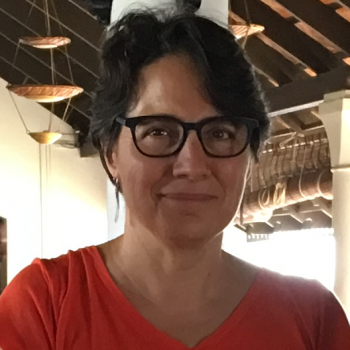
Terre Satterfield
Professor of Culture, Risk and the Environment, IRES
Contact Details
AERL Room 417
2202 Main Mall
The University of British Columbia
Vancouver, BC V6T 1Z4
Canada
terre.satterfield[at]ires.ubc.ca
Google scholar:
https://scholar.google.com/citations?user=1nrd2msAAAAJ&hl=en&oi=ao
Research Interests
Bio
Terre’s work has been at the forefront of the environmental social sciences, and includes pioneering interdisciplinary work on questions of the value, culture, and perceived risks of environmental change. Three fundamental questions drive her work: What do people value environmentally and culturally and why? What changes and impacts (including technological interventions in nature) do people perceive as risky and why? How and when are conservation programs and protected areas culturally consequential for local and Indigenous communities? Methodologically speaking, Terre’s work with over 30 PhD, and 10 Masters students, has been particularly preoccupied with addressing the integration of meaning and measurement across these three topical areas.
Her body of scholarship includes 3 books, multiple book chapters, and more than 120 refereed articles in top-quality, broad audience journals including: Nature, Proceedings of the National Academy of Sciences, Global Environmental Change, Environmental Science and Technology, Ecological Economics, Climatic Change, Annual Reviews, Conservation Letters, Conservation Biology, Biological Conservation, Energy Research and Social Sciences, Risk Analysis, Organization and the Environment, Environmental Science and Policy, Ecology and Society, World Development, among others.
Recent work with students and colleagues
Click on each question below to view relevant papers.
What do people value environmentally and culturally: how and why?
Robin Gregory, Philip Halteman, Nicole Kaechele, Terre Satterfield. Methods for assessing social and cultural losses. Science 381,478-481(2023).
Erika R. Gavenus, Rachelle Beveridge, Terre Satterfield. Restorative diets: a methodological exploration comparing historical and contemporary salmon harvest rates. Ecology and Society. 2023.
Eyster, Harold N., Terre Satterfield, and Kai MA Chan. Empirical examples demonstrate how relational thinking might enrich science and practice. People and Nature 5.2 (2023): 455-469.
Persaud, Anthony W., Harry W. Nelson, and Terre Satterfield. “Reconciling Institutional Logics Within First Nations Forestry-Based Social Enterprises.” Organization & Environment 35, no. 3 (September 1, 2022): 394–413.
Klain, Sarah, Terre Satterfield, Kai M. A. Chan, and Kreg Lindberg. “Octopus’s Garden under the Blade: Boosting Biodiversity Increases Willingness to Pay for Offshore Wind in the United States.” Energy Research & Social Science 69 (November 1, 2020): 101744.
Chapman, Mollie, Terre Satterfield, Hannah Wittman, and Kai M. A. Chan. “A Payment by Any Other Name: Is Costa Rica’s PES a Payment for Services or a Support for Stewards?” World Development 129 (May 1, 2020): 104900.
Chapman, Mollie, Terre Satterfield, and Kai M. A. Chan. “How Value Conflicts Infected the Science of Riparian Restoration for Endangered Salmon Habitat in America’s Pacific Northwest: Lessons for the Application of Conservation Science to Policy.” Biological Conservation 244 (April 1, 2020): 108508.
Gregory, Robin, Philip Halteman, Nicole Kaechele, Jana Kotaska, and Terre Satterfield. “Compensating Indigenous Social and Cultural Losses: A Community-Based Multiple-Attribute Approach.” Ecology and Society 25, no. 4 (2020): art4.
Wilson, Nicole J., Leila M. Harris, Angie Joseph-Rear, Jody Beaumont, and Terre Satterfield. “Water Is Medicine: Reimagining Water Security through Tr’ondëk Hwëch’in Relationships to Treated and Traditional Water Sources in Yukon, Canada.” Water 11, no. 3 (March 2019): 624.
Satterfield, Terre, Mary Collins, and Barbara Harthorn. “Perceiving Resilience: Understanding People’s Intuitions about the Qualities of Air, Water, and Soil.” Ecology and Society 23, no. 4 (December 21, 2018).
Gould, Rachelle K., Sarah C. Klain, Nicole M. Ardoin, Terre Satterfield, Ulalia Woodside, Neil Hannahs, Gretchen C. Daily, and Kai M. Chan. “A protocol for eliciting nonmaterial values through a cultural ecosystem services frame.” Conservation Biology 29, no. 2 (2015): 575–86.
Levine, Jordan, Kai M. A. Chan, and Terre Satterfield. “From Rational Actor to Efficient Complexity Manager: Exorcising the Ghost of Homo Economicus with a Unified Synthesis of Cognition Research.” Ecological Economics 114, no. C (2015): 22–32.
What are the perceived risks of technological interventions in nature?
Satterfield, Terre, Sara Nawaz, and Miranda Boettcher. “Social Considerations and Best Practices for Engaging Publics on Ocean Alkalinity Enhancement.” State of the Planet Discussions, June 15, 2023, 1–39. https://doi.org/10.5194/sp-2023-3.
Nawaz, Sara, Guillaume Peterson St-Laurent, and Terre Satterfield. “Public Evaluations of Four Approaches to Ocean-Based Carbon Dioxide Removal.” Climate Policy 23, no. 3 (March 16, 2023): 379–94. https://doi.org/10.1080/14693062.2023.2179589.
Satterfield, Terre, Sara Nawaz, and Guillaume Peterson St-Laurent. “Exploring Public Acceptability of Direct Air Carbon Capture with Storage: Climate Urgency, Moral Hazards and Perceptions of the ‘Whole versus the Parts.’” Climatic Change 176, no. 2 (January 28, 2023): 14. https://doi.org/10.1007/s10584-023-03483-7.
Cooley, Sarah R., Sonja Klinsky, David R. Morrow, and Terre Satterfield. “Sociotechnical Considerations About Ocean Carbon Dioxide Removal.” Annual Review of Marine Science 15, no. 1 (2023): 41–66. https://doi.org/10.1146/annurev-marine-032122-113850.
Nawaz, Sara, and Terre Satterfield. “On the Nature of Naturalness? Theorizing ‘Nature’ for the Study of Public Perceptions of Novel Genomic Technologies in Agriculture and Conservation.” Environmental Science & Policy 136 (October 1, 2022): 291–303. https://doi.org/10.1016/j.envsci.2022.06.008.
Nawaz, Sara, and Terre Satterfield. “Climate Solution or Corporate Co-Optation? US and Canadian Publics’ Views on Agricultural Gene Editing.” PLoS ONE 17, no. 3 (March 21, 2022): e0265635. https://doi.org/10.1371/journal.pone.0265635.
Hagerman, Shannon, Terre Satterfield, Sara Nawaz, Guillaume Peterson St-Laurent, Robert Kozak, and Robin Gregory. “Social Comfort Zones for Transformative Conservation Decisions in a Changing Climate.” Conservation Biology 35, no. 6 (2021): 1932–43. https://doi.org/10.1111/cobi.13759.
Dieckmann, Nathan F., Robin Gregory, Terre Satterfield, Marcus Mayorga, and Paul Slovic. “Characterizing Public Perceptions of Social and Cultural Impacts in Policy Decisions.” Proceedings of the National Academy of Sciences 118, no. 24 (June 15, 2021): e2020491118. https://doi.org/10.1073/pnas.2020491118.
Nawaz, Sara, Terre Satterfield, and Shannon Hagerman. “From Seed to Sequence: Dematerialization and the Battle to (Re)Define Genetic Resources.” Global Environmental Change 68 (May 1, 2021): 102260. https://doi.org/10.1016/j.gloenvcha.2021.102260.
Findlater, Kieran M., Terre Satterfield, and Milind Kandlikar. “Farmers’ Risk-Based Decision Making Under Pervasive Uncertainty: Cognitive Thresholds and Hazy Hedging.” Risk Analysis 39, no. 8 (2019): 1755–70. https://doi.org/10.1111/risa.13290.
Findlater, Kieran M., Terre Satterfield, Milind Kandlikar, and Simon D. Donner. “Six Languages for a Risky Climate: How Farmers React to Weather and Climate Change.” Climatic Change 148, no. 4 (June 1, 2018): 451–65. https://doi.org/10.1007/s10584-018-2217-z.
Findlater, K. M., S. D. Donner, T. Satterfield, and M. Kandlikar. “Integration Anxiety: The Cognitive Isolation of Climate Change.” Global Environmental Change 50 (May 1, 2018): 178–89. https://doi.org/10.1016/j.gloenvcha.2018.02.010.
Klain, Sarah C., Terre Satterfield, Jim Sinner, Joanne I. Ellis, and Kai M. A. Chan. “Bird Killer, Industrial Intruder or Clean Energy? Perceiving Risks to Ecosystem Services Due to an Offshore Wind Farm.” Ecological Economics 143 (January 1, 2018): 111–29. https://doi.org/10.1016/j.ecolecon.2017.06.030.
Klain, Sarah C., Terre Satterfield, Suzanne MacDonald, Nicholas Battista, and Kai M. A. Chan. “Will Communities ‘Open-up’ to Offshore Wind? Lessons Learned from New England Islands in the United States.” Energy Research & Social Science 34 (December 1, 2017): 13–26. https://doi.org/10.1016/j.erss.2017.05.009.
When are conservation programs consequential for communities and why?
Jolly, Helina, Terre Satterfield, Milind Kandlikar, and TR Suma. “Locating Kadu in Adivasi Portrayals of Protected Forest Areas in Southern India.” World Development 173 (January 1, 2024): 106390. https://doi.org/10.1016/j.worlddev.2023.106390.
Chignell, Stephen M., and Terre Satterfield. “Seeing beyond the Frames We Inherit: A Challenge to Tenacious Conservation Narratives.” People and Nature n/a, no. n/a. November 28, 2023. https://doi.org/10.1002/pan3.10550.
Lim, Tee Wern, Arn Keeling, and Terre Satterfield. “‘We Thought It Would Last Forever’: The Social Scars and Legacy Effects of Mine Closure at Nanisivik, Canada’s First High Arctic Mine.” Labour / Le Travail 91 (May 25, 2023): 115–46. https://doi.org/10.52975/llt.2023v91.008.
Jolly, Helina, Terre Satterfield, Milind Kandlikar, and Suma Tr. “Indigenous Insights on Human–Wildlife Coexistence in Southern India.” Conservation Biology 36, no. 6 (2022): e13981. https://doi.org/10.1111/cobi.13981.
Gregory, Robin, Robert Kozak, Guillaume Peterson St-Laurent, Sara Nawaz, Terre Satterfield, and Shannon Hagerman. “Under Pressure: Conservation Choices and the Threat of Species Extinction.” Climatic Change 166, no. 1 (May 3, 2021): 2. https://doi.org/10.1007/s10584-021-03102-3.
Witter, Rebecca, and Terre Satterfield. “Rhino Poaching and the ‘Slow Violence’ of Conservation-Related Resettlement in Mozambique’s Limpopo National Park.” Geoforum 101 (May 1, 2019): 275–84. https://doi.org/10.1016/j.geoforum.2018.06.003.
Witter, Rebecca, and Terre Satterfield. “The Ebb and Flow of Indigenous Rights Recognitions in Conservation Policy.” Development and Change 50, no. 4 (2019): 1083–1108. https://doi.org/10.1111/dech.12456.
Wilson, Nicole J., Edda Mutter, Jody Inkster, and Terre Satterfield. “Community-Based Monitoring as the Practice of Indigenous Governance: A Case Study of Indigenous-Led Water Quality Monitoring in the Yukon River Basin.” Journal of Environmental Management 210 (March 15, 2018): 290–98. https://doi.org/10.1016/j.jenvman.2018.01.020.
Bennett, Nathan J., and Terre Satterfield. “Environmental Governance: A Practical Framework to Guide Design, Evaluation, and Analysis.” Conservation Letters 11, no. 6 (2018): e12600. https://doi.org/10.1111/conl.12600.
Bennett, Nathan James, Hugh Govan, and Terre Satterfield. “Ocean Grabbing.” Marine Policy 57 (July 1, 2015): 61–68. https://doi.org/10.1016/j.marpol.2015.03.026.
Supervision
Current Students
Erika Gavenus
Rapichan Phurisamban
Sarah-Louise Ruder (co-supervised with Hannah Wittman)
Stephen Chignell (co-supervised with Mark Johnson)
Glory Apantaku (co-supervised with Mark Harrison in SPPH)
Jessica Koski (co-supervised with David Boyd)
Nicole Kaechele
Tee Lim (co-supervise with Glen Coulthard, Political Science)
Previous Students (click to view)
Ph.D. Students/ Supervised or Co-Supervised
Daniela Kalikoski (co-supervised with Les Lavkulich)
David Brownstein (co-supervised with Graeme Wynn)
Joleen Timko (co-supervised with John Innes)
Virginia Gibson (co-supervsied with M. Scoble)
Maria du Monceau
Tihut Asfaw
Jamie Donatuto
Teresa Ryan (co-supervised with Ron Tropser)
Shannon Hagerman (co-supervised with Hadi Dowlatabadi)
Alyssa Joyce co-supervised with Tim McDaniels)
David Richard Boyd
Anton Pitts
Jana Kotaska
Julia Freeman (co-supervised with Milind Kandlikar)
Christian Beaudrie (co-supervised with Milind Kandlikar)
Jordan Levine (co-supervised with Kai Chan)
Jordan Tam (co-supervised with Kai Chan)
Maggie Low
Mollie Chapman (co-supervised with Kai Chan)
Kieran Findlater (co-supervised with Milind Kandlikar)
Jason Brown
Nicole Wilson
Jonathan Taggart (co-supervised with Kai Chan)
Megan Callahan
Johnnie Manson
Anthony Persaud
Helina Jolly
Sara Nawaz
Madison Stevens
Masters Students/Supervised
Bronwen Geddes
Lisa Ligouri
Yolanda Yim
Michael Zelmer
Andrea Streilein
Tee Lim (co-supervised with Frank Tester)
Megan Callahan
Johnnie Manson
Maery Kaplan-Hallam
Alida O’Connor
Adrian Semmelink
Hollis Andrews
Rae Cramer
Nayadeth Arriagada (co-supervised with David Boyd)
Patricia Angkiriwang
Allison Cutting (co-supervised with Rashid Sumaila)
Courses
ENVR 410 Energy, Environment and Society
ASIC 220 Introduction to Sustainability
RES 530 Science, Policy and Values in Risk and Resource Management Contexts
RES 507 Human and Technological Systems
RES 504 Survey Design in Interdisciplinary Environmental Research
Milind Kandlikar

Milind Kandlikar
Professor, IRES
Professor, School of Public Policy and Global Affairs
Contact Details
AERL Room 422
2202 Main Mall
The University of British Columbia
Vancouver, BC V6T 1Z4
Canada
https://sppga.ubc.ca/profile/milind-kandlikar/
Google Scholar: https://scholar.google.ca/citations?user=aL55yHEAAAAJ&hl=en
Research Interests
Bio
Milind Kandlikar is Professor at the School of Public Policy and Global Affairs (SPPGA) and the Institute for Resources, Environment and Sustainability (IRES). He is the former Director of IRES and his work focuses on the intersection of technology innovation, human development and climate science. His current projects include cross-national comparisons of regulation of agricultural biotechnology; air quality in Indian cities; risks and benefits of nanotechnology; new technologies for sustainable transportation; and development and climate change.
Projects
Technological Change and Life Cycle Assessment in Auto-Sector
http://www.ligi.ubc.ca/?p2=/modules/liu/researches/research.jsp&id=24
This projects examines the impact of technological and regulatory innovation such as product “take-back” policies on reuse, recycling in the automobile sector.
Transport, Air Quality and Development
http://www.ligi.ubc.ca/?p2=/modules/liu/researches/research.jsp&id=25
This projects explores the relationship between transport policies and air quality outcomes in the develolping world, with focused case studies of India.
Risks and Benefits of Nanotechnology
http://www.ligi.ubc.ca/?p2=/modules/liu/researches/research.jsp&id=27
This work focuses on quantifying the health risks from nanoparticles using expert judgment; I also work on how scientists view the regulation of health risks from nanotechnology.
Climate Science, Equity and Development: The Role of International Institutions in Capacity Building for Climate Change
http://www.ligi.ubc.ca/?p2=/modules/liu/researches/research.jsp&id=40
Due to its global nature, the climate change problem is one that reveals wide disparities between countries.
Global Focus: Hybrid vehicles produce scant environmental benefits, high cost
http://www.ligi.ubc.ca/?p2=/modules/liu/researches/research.jsp&id=45
Despite major costs to taxpayers in the U.S. and Canada, government programs that offer rebates to hybrid vehicle buyers are failing to produce environmental benefits, a new UBC study says.
India: Can solar power become a tool for pro-poor development?
http://www.ligi.ubc.ca/?p2=/modules/liu/researches/research.jsp&id=76
Recepients of the Martha Piper Research fund, associate professor Milind Kandlikar and Sumeet Gulati want to find out if solar power can be a viable energy solution for the 100 million households in rural india who do not have access to electricity.
Re-thinking the rickshaw
http://www.ligi.ubc.ca/?p2=/modules/liu/researches/research.jsp&id=71
If you’ve been to parts of Asia or Africa, chances are a three-wheeled auto rickshaw got you from A to B. Cheap to drive and compact enough for a driver to whisk passengers through crowded streets, they are a vital mode of transportation for billions of people around the world everyday. But under their brightly painted exteriors, auto rickshaws have a dark side, a new UBC study has found.
The Right to Food: Food Access, Food Subsidy, and Residue-Based Bioenergy Production in India
http://www.ligi.ubc.ca/?p2=/modules/liu/researches/research.jsp&id=78
Researchers at the Liu Institute for Global Issues will be working to answer important questions on food security in India, thanks to a grant from the International Development Research Centre (IDRC).
Food Security Policy in Asia – An International Symposium
http://www.ligi.ubc.ca/?p2=/modules/liu/researches/research.jsp&id=79
A partnership between the Liu Institute, Asia Development Bank, and the Canadian International Development Agency will be sharing best practices and enhancing policy dialogue on food security in Asia and the Pacific region.
A framework for screening human health and environmental risks from nanomaterials
http://www.ligi.ubc.ca/?p2=/modules/liu/researches/research.jsp&id=81
On May 24th and 25th, 2012, the Liu Institute hosted a group of experts for a workshop on nanotoxicology, human exposure assessment, and environmental fate and transport.
Courses
RMES 502 Interdisciplinary Case Analysis and Research Design
Featured Publications
Javed, Bassam, Amanda Giang, and Milind Kandlikar. Variability in costs of electrifying passenger cars in Canada. Environmental Research: Infrastructure and Sustainability, 2024.
Sidhu, B. S., Mehrabi, Z., Ramankutty, N., Kandlikar, M. How can machine learning help in understanding the impact of climate change on crop yields? Environmental Research Letters, 2023.
Bhatt, R., Giang, A., Kandlikar, M. Incentivizing alternatives to agricultural waste burning in Northern India: trust, awareness, and access as barriers to adoption. Environment Systems and Decisions, 1-13, 2023.
Stephanie Chang
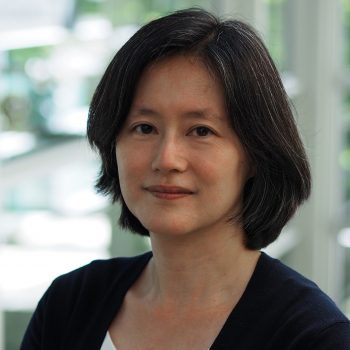
Stephanie Chang
Professor, IRES
Professor, School of Community and Regional Planning
Contact Details
West Mall Annex Room 241
1933 West Mall
The University of British Columbia
Vancouver, BC V6T 1Z2
Canada
stephanie.chang[at]ubc.ca
Personal website:
https://sites.google.com/site/stephanieechang1/home
Google scholar:
https://scholar.google.com/citations?hl=en&user=eyT7IMIAAAAJ
Research Interests
Bio
At UBC, Dr. Stephanie Chang is a professor with joint appointments in the School of Community and Regional Planning (SCARP) and IRES. She currently serves as co-director of the Master of Engineering Leadership (MEL) in Urban Systems program.
Dr. Chang held a Canada Research Chair (Tier 2) in Disaster Management and Urban Sustainability from 2004 to 2013. Much of her work aims to bridge engineering, natural sciences, and social sciences in addressing the complex issues of hazards and disasters. Her research has ranged from empirical investigation of major urban disasters to computer modeling and economic analysis of risk reduction strategies. She is particularly interested in issues of urban risk dynamics, disaster recovery and resilience, infrastructure systems, climate change adaptation, and coastal cities.
Dr. Chang was awarded the 2001 Shah Family Innovation Prize by the Earthquake Engineering Research Institute (EERI), was EERI’s 2011 Distinguished Lecturer, and received the 2018 Distinguished Research Award from the Integrated Disaster Risk Management Society (IDRiM). She has served on the editorial boards of Earthquake Spectra, Environmental Hazards, and Natural Hazards. She was a member of the U.S. National Research Council’s Committee on Disaster Research in the Social Sciences, as well as its Committee on Earthquake Resilience – Research, Implementation, and Outreach. From 2021-2022 she served on the Council of Canadian Academies’ expert panel on Disaster Resilience in a Changing Climate, whose final report identified opportunities to better integrate climate change adaptation and disaster risk reduction efforts to enhance resilience.
Projects
Supporting Business Preparation for Future Shocks: International Cases to Understand How Recovery Programs Can Facilitate Adaptation (BRIDGE)
This study investigates the effectiveness of government policies in supporting business recovery from the COVID-19 pandemic. Together with an international research team, Dr. Chang and her students are conducting coordinated data collection across 10~15 cities around the world. They seek to understand how businesses were impacted by the pandemic, how government policies influenced their recovery, and how policies can best support businesses’ capacity to withstand future crises, including climate-related disasters. This study is a collaboration with researchers in the U.S., Japan, New Zealand, and the Netherlands.
BC Local Government Actions to Address Coastal Flooding, Sea-Level Rise, and Tsunami Hazard
This project examines how coastal municipalities and other communities in British Columbia are currently addressing coastal flooding risks, including sea-level rise and tsunami inundation. Building on the Resilient Coasts Canada project, Dr. Chang and her students are developing an overview of the state of coastal adaptation across BC in 2023.
Living with Water
Dr. Chang and her students are participating in this project to help communities on BC’s South Coast prepare and adapt for sea level rise and flooding.
Reducing the Catastrophic Risk of a Cascadia Megathrust Earthquake
A major earthquake on the Cascadia Subduction Zone (CSZ) could cause devastating impacts across the Cascadia region, including British Columbia. This project brings together an interdisciplinary team of researchers to address the following objectives: (1) to quantify expected ground shaking associated with M8-9 earthquakes in the CSZ; (2) to understand how the built environment will perform; and (3) to identify community risk reduction and resilience strategies. The study is a collaboration with Carlos Molina Hutt at UBC (structural engineering) and Sheri Molnar and Katsuichiro Goda at Western University (seismology). Dr. Chang and her students are focused on understanding socio-economic vulnerability in Vancouver’s West End neighbourhood.
Courses
PLAN 531 Planning for Disaster-Resilient Communities
PLAN 506 Information and Analysis in Planning (restricted to MCRP students)
Prospective Students/Colleagues
Dr. Chang welcomes applicants from a variety of academic backgrounds including geography, urban planning, civil engineering, and environmental sciences, for example. Since her current projects have a focus on urban disaster risk and resilience, her group is especially looking for colleagues and scholars who bring skills in quantitative analysis (e.g., GIS and urban modeling), a demonstrated interest in hazards and disasters, and an orientation towards interdisciplinary, applied research.
Hadi Dowlatabadi

Hadi Dowlatabadi
Professor Emeritus, Canada Research Chair (T1, Applied Mathematics of Global Change)
Contact Details
AERL Room 422
2202 Main Mall
The University of British Columbia
Vancouver, BC V6T 1Z4
Canada
http://blogs.ubc.ca/dowlatabadi/welcome/
Research Interests
Bio
Hadi Dowlatabadi’s research is at the nexus of humans, technology and the environment. He has studied climate change and its related response strategies since 1986. His projects are solution oriented and usually fall outside familiar disciplinary grounds. He sees the world as a dynamic non-equilibrium heterogeneous system where the search for complexity leads to paralysis and over-simplification spells trouble.
Hadi has a wide range of publications from books on how to choose electricity generation technologies to different determinants of malaria around the world. He has over 150 peer-reviewed papers and has supervised almost three-dozen PhDs. He serves on the editorial boards of five journals. Hadi is a co-founder of half a dozen companies attempting to refine and market technologies that pave the way to a zero carbon economy. He is a University Fellow at Resources for the Future, a Washington DC think-tank. He is also Adjunct Professor at Carnegie Mellon University’s Department of Engineering & Public Policy.
Website: http://blogs.ubc.ca/dowlatabadi/welcome/
Google Scholar: https://scholar.google.ca/citations?user=9pMu_28AAAAJ&hl=en
Prospective Students/Colleagues
Hadi retired in July 2022 and will no longer be accepting new advisees. However, he advises that you can find many potential supervisors at UBC using the Graduate School’s Supervisors Search Tool.
Hadi encourages the use of keywords to search on the site above for topics that match your interests. Having found a few suitable supervisors, one should then search for their publications on Google Scholar and read at least three papers from each potential supervisor. Applicants can use supervisors’ websites to contact some of their current and past students. These students can advise if the university and researcher have been supportive and met their needs — or at least highlight some of the challenges that will need to be addressed should one get into that program. Having completed all this research, one can decide who to work with and can proceed with contacting them. When writing to professors, mention their work explicitly. This step to the search for a position in academia is critical to finding a supportive mentor.
Projects
Energy & Climate Change
, – ,
Hadi is interested in energy poverty and carbon footprints. When it comes to decarbonizing the built environment, the dysfunction in management of transition at various levels of government needs to be addressed. There is a need for realistic multisector responses that include many other elements of global change beyond climate.
Environmental Protection & Development
, – ,
Environmental protection is only meaningful when total exposure to harm can be held below an acceptable level of impact. New projects should only be possible if there is room to pollute without violating that threshold. Guiding questions include: How are criteria for evaluating new projects set? How are these monitored and are violations punished? Should we be rethinking what cumulative effects assessment means?
The Built Environment
, – ,
High performance buildings perform so poorly; Hadi and team ask why this is the case. They also ask whether Integrated Project Delivery provides a better platform for building better buildings. Research also focusses on how the City of Vancouver can reduce the barriers to existing buildings for meeting their zero emissions target.
Assuming responsibility for intergenerational transfers
, – ,
Our physical, cultural, legal and ecological environment is a cumulative legacy of past generations. Our actions modify these and pass them on to future generations. Most people living in richer countries have no appreciation of how they came to be so fortunate, at the cost to those living poorly in their own vicinity and beyond. Colonialism, climate change and cultural tsunamis are all such legacies. Do we recognize what led to our good fortunes? Are we willing to redress impacts from past actions?
Courses
RMES 507 Human and Technological Systems
RMES 520 Climate change: science, technology and sustainable development
RMES 542 Intro to Integrated Assessment
Featured Publications
Mark Johnson
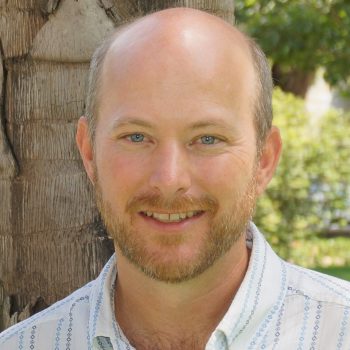
Mark Johnson
Professor, IRES
Professor, Earth, Ocean and Atmospheric Sciences
Canada Research Chair (T2, Ecohydrology)
Contact Details
AERL Room 421
2202 Main Mall
The University of British Columbia
Vancouver, BC V6T 1Z4
Canada
Google Scholar: https://scholar.google.ca/citations?user=KfQwll4AAAAJ&hl=en
Bio
Dr. Mark Johnson is working to understand how land use practices influence interactions between hydrological and ecological processes, and how these ecohydrological processes further affect ecosystem services including carbon sequestration. Unraveling interactions between the water cycle and the carbon cycle is essential for improving the sustainability of land and water management, especially under changing climatic conditions. Dr. Johnson’s research in ecohydrology demonstrates that soil carbon processes are also integrally important to the health of freshwater ecosystems and drinking water supplies. Dr. Johnson and his team are testing carbon and water cycle interactions to address questions such as: How much carbon does water transport from the land into freshwater systems? His research can also help to answer very applied questions related to soil fertility and water use such as: How much food can be produced in urban environments, and how much water would that require? To address these and other related questions, Johnson is developing innovative approaches to ecohydrological research in partnership with communities, natural resource management agencies and organizations, and industry.
Projects
AgWIT
http://ecohydro.ires.ubc.ca/agwit
Agricultural Water Innovations in the Tropics
Carbon Drainage
http://ecohydro.ires.ubc.ca/carbon-drainage
Ecohydrological controls on carbon drainage fluxes in natural and human-impacted watersheds
Courses
RES 500A Global aspects of Ecohydrology
RES 510 Social-Ecological Systems
ENVR 420 Ecohydrology of Watersheds and Water Systems
ENVR 200 Introduction to Environmental Sciences
SCIE 113 First Year Seminar in Science
Featured Publications
Full publication list (including papers accepted or in press) at http://ecohydro.ires.ubc.ca/publications.
Publications sorted by most recent: https://scholar.google.ca/citations?hl=en&user=KfQwll4AAAAJ&view_op=list_works&sortby=pubdate